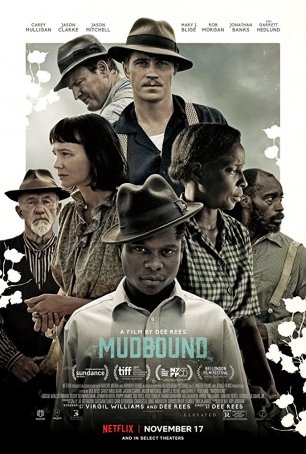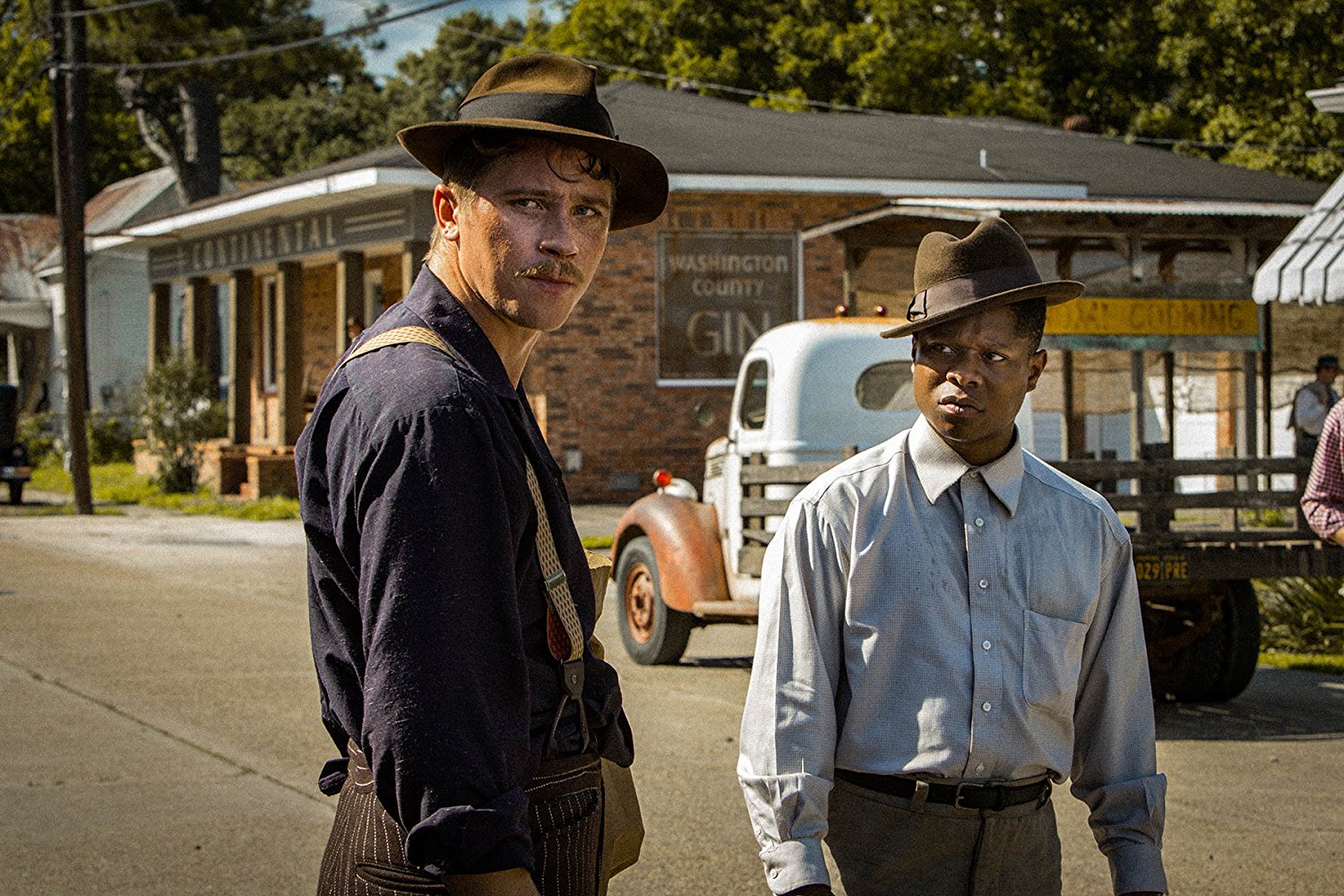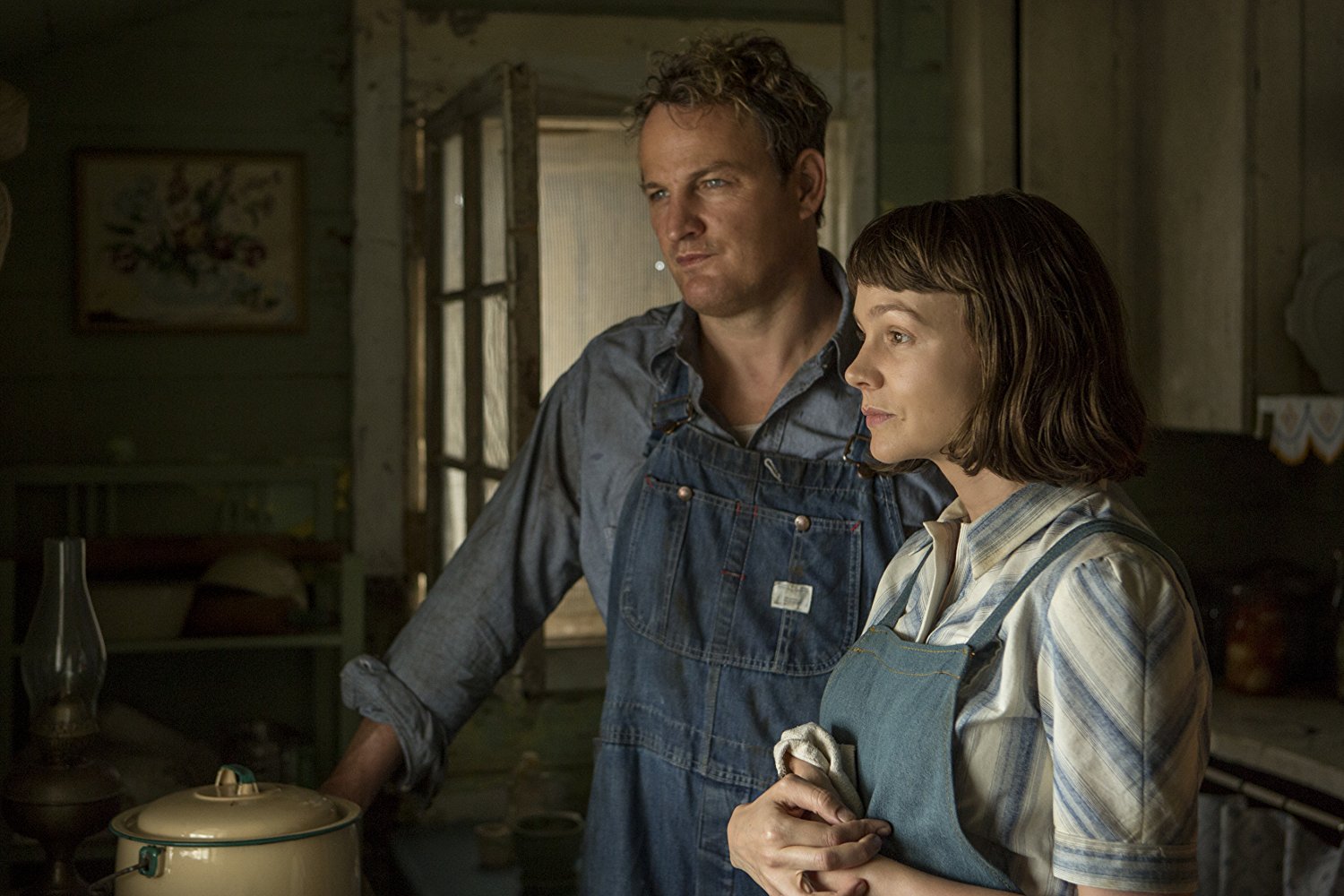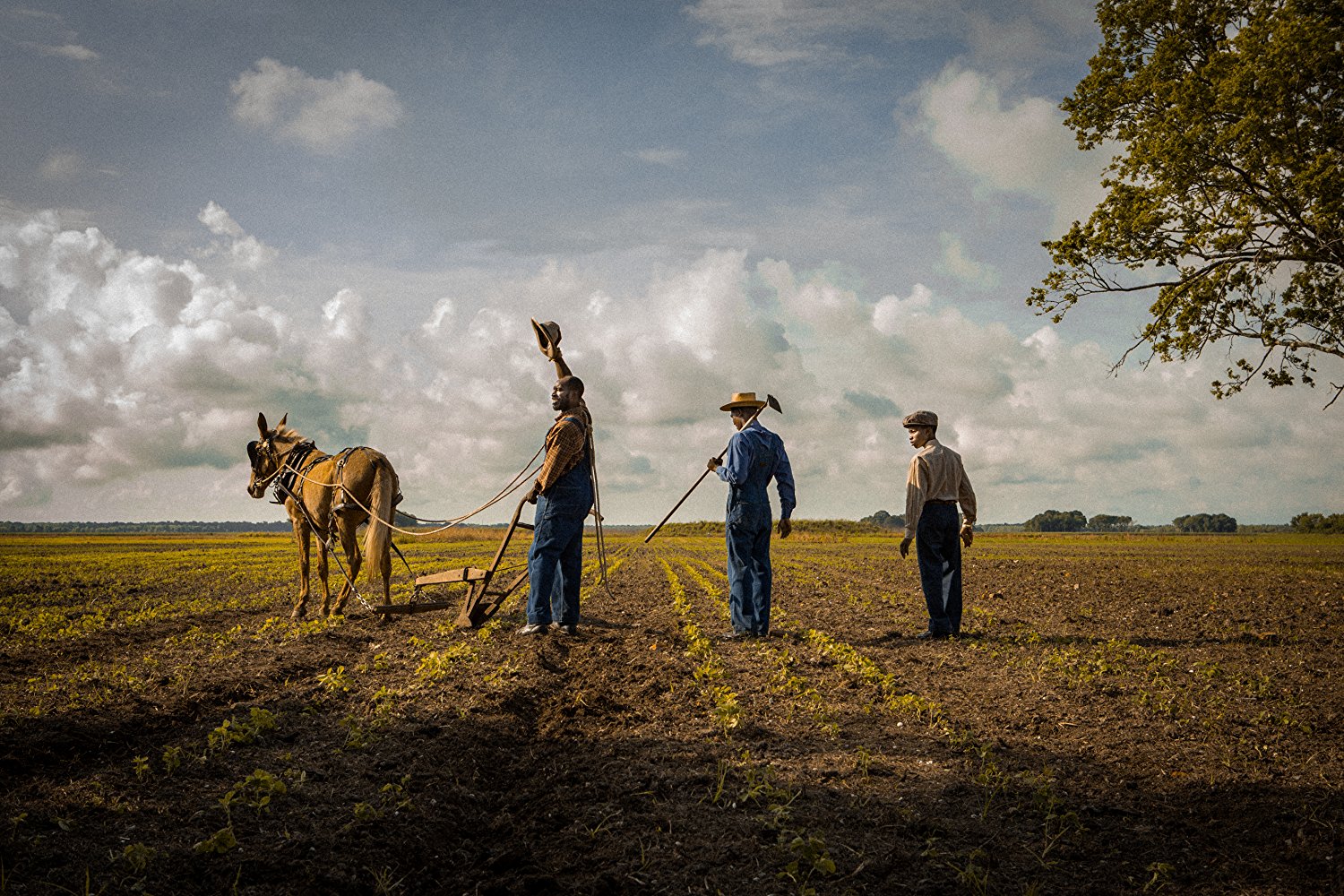Mudbound (United States, 2017)
November 19, 2017
At the heart of Mudbound, director Dee Rees’ adaptation of Hillary Jordan’s novel, is the relationship that forms (and the consequences of that relationship) between two World War 2 veterans – one white and one black – in the deeply segregated rural areas of Mississippi during the 1940s. These two men, Jamie McAllan (Garrett Hedlund) and Ronsel Jackson (Jason Mitchell), have much in common except the color of their skin. In reaching deep into the ugliness of a racist South, Mudbound strips away the romanticism sometimes associated with it and shows that, while friendships were possible between white and black people, the pernicious aspects of Jim Crow made such things fleeting and furtive. The movie, like the book, takes a long, hard look at the system of racial inequality that defined this time and place, and reminds viewers of the price to be paid for surrendering to our base instincts.
Mudbound tells its story primarily through flashbacks of two interconnected families. The (white) McAllans come to Mississippi to fulfill the life-long dream of Henry (Jason Clarke) to farm the land. Swindled out of renting an ideal house, he is forced to bring his family – wife Laura (Carey Mulligan) and two young daughters – to a leaky shack with no plumbing or electricity. Accompanying them is Pappy (Jonathan Banks), an unrepentant racist who sees everything through a lens dirty from decades of bile and hatred. Henry’s dashing younger brother, Jamie, is currently off to war, earning a Captain’s rank as he flies bomber runs over Germany.
 The Jacksons live as tenant famers on the McAllans’ land.
Hard-working and deeply devoted, they have lived and worked there since the
slave days. The patriarch, Hap (Rob Morgan), dreams of bright future for his
children. His wife, Florence (Mary J. Blige), cares for her family and works
the fields while keeping her distance from the new white folk, whom life’s
lessons have taught her not to trust. The eldest Jackson son, Ronsel, is
serving his country in Europe as a tank commander in General Patton’s army.
The Jacksons live as tenant famers on the McAllans’ land.
Hard-working and deeply devoted, they have lived and worked there since the
slave days. The patriarch, Hap (Rob Morgan), dreams of bright future for his
children. His wife, Florence (Mary J. Blige), cares for her family and works
the fields while keeping her distance from the new white folk, whom life’s
lessons have taught her not to trust. The eldest Jackson son, Ronsel, is
serving his country in Europe as a tank commander in General Patton’s army.
The end of the war brings about changes when Jamie and Ronsel come home. Both men are subtly altered by their experiences. Jamie suffers from severe PTSD and uses heavy drinking for self-medication. Neither Henry no Pappy is sympathetic to him, although Laura offers him a kind ear (and perhaps a little more). Ronsel’s suffering is more internalized but he finds himself angry and adrift, missing a woman he left behind in Germany and disgusted that, despite having served his country with distinction, he is regarded at home as a second-class citizen. He and Jamie are drawn together by their common experiences and develop a friendship that ultimately has profound consequences for them both.
 Mudbound turns a
clear gaze on racism in many of its forms and guises, both large and small.
There are the obvious aspects, like the constant threats of violence, the
segregation of buses and store entrances, and the white hoods of the Ku Klux
Klan. And there are the subtle ones, like the entitlement of some whites who,
although seemingly respectful, expect subservience from blacks, or the way
sharecropping is rigged to force many black farmers into states of
near-slavery. The film also shows the contrast between how black soldiers are
treated overseas and what awaits them on their return.
Mudbound turns a
clear gaze on racism in many of its forms and guises, both large and small.
There are the obvious aspects, like the constant threats of violence, the
segregation of buses and store entrances, and the white hoods of the Ku Klux
Klan. And there are the subtle ones, like the entitlement of some whites who,
although seemingly respectful, expect subservience from blacks, or the way
sharecropping is rigged to force many black farmers into states of
near-slavery. The film also shows the contrast between how black soldiers are
treated overseas and what awaits them on their return.
The characters are as carefully developed as the setting. With one exception, every member of the ensemble boasts a three-dimensional personality with a discernable arc. To enhance this, six of the seven primary individuals are given voiceover monologues that provide the viewer not only with valuable background information but with a window into their thinking. The exception, Pappy, is less a person than an embodiment of the worst of racial hatred. Pappy has no redeeming qualities. He is vitriol personified. The real villain of Mudbound is racism but, since it can be difficult to effectively dramatize the struggle against an ideal, no matter how heinous, Pappy provides an effective stand-in.
There is a tendency of movies made about the pre-Civil Rights era South to depict it as an idyllic place forced into decline by the cycles of poverty and deprivation resulting from the failed secession. Mudbound strips away the faux nobility germinated by misplaced nostalgia. The land upon which so much depends for the McAllans and the Jacksons is a quagmire or, as Laura states in her opening monologue: “When I think of the farm, I think of mud…There was no defeating it. The mud coated everything.” The production design takes these words and gives them visual life. I can’t think of a less appealing place to spend my life than the plantation where the McAllans have settled.
 Strong performances abound but the three that stand out are
those of Garett Hedlund, whose tortured charisma embodies a once-proud,
confidant man eviscerated by experience he relives every night; Jason Mitchell,
whose quiet dignity gives testimony to the strength of his character’s soul;
and Jonathan Banks, whose portrayal of unvarnished evil is chilling. The other
key roles are filled by Carey Mulligan, Jason Clarke, Rob Morgan, and Mary J.
Blige. All are solid but none resonate as forcefully as the other three.
Strong performances abound but the three that stand out are
those of Garett Hedlund, whose tortured charisma embodies a once-proud,
confidant man eviscerated by experience he relives every night; Jason Mitchell,
whose quiet dignity gives testimony to the strength of his character’s soul;
and Jonathan Banks, whose portrayal of unvarnished evil is chilling. The other
key roles are filled by Carey Mulligan, Jason Clarke, Rob Morgan, and Mary J.
Blige. All are solid but none resonate as forcefully as the other three.
Mudbound makes few missteps. One arguable flaw is the inclusion of a family of poverty-stricken white farmers who are turned away by Henry because of the father’s poor work habits. Although likely intended to provide a contrast to the Jacksons and perhaps even an indication of the thing Henry fears becoming, these characters are thinly sketched and their story is inconsistently presented.
Rees has chosen to remain faithful to the ending of the book while, at the same time, injecting a hopeful note. Jordan wrote the final passages of Mudbound as a series of speculative, “what if?” moments. While maintaining the text of those sentences, Rees takes away the question marks and replaces them with exclamation points. It’s the perfect way to conclude the saga, making it an affirmation of human determination and dignity.
Mudbound was released on Netflix simultaneously with a limited theatrical distribution thereby making it readily available to millions of subscribers.
Mudbound (United States, 2017)
Cast: Carey Mulligan, Jason Clarke, Garrett Hedlund, Jason Mitchell, Rob Morgan, Mary J. Blige, Jonathan Banks
Screenplay: Virgil Williams and Dee Rees, based on the novel by Hillary Jordan
Cinematography: Rachel Morrison
Music: Tamar-Kali Brown
U.S. Distributor: Netflix
U.S. Release Date: 2017-11-17
MPAA Rating: "R" (Violence, Profanity, Sexual Content, Nudity)
Genre: Drama
Subtitles: none
Theatrical Aspect Ratio: 2.35:1
Comments